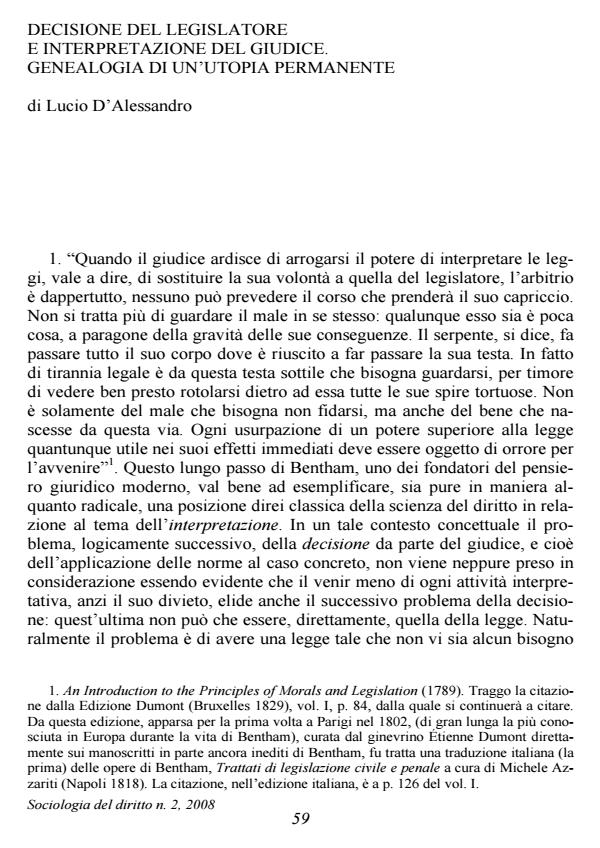Decisione del legislatore e interpretazione del giudice. Genealogia di un'utopia permanente
Journal title SOCIOLOGIA DEL DIRITTO
Author/s Lucio D’Alessandro
Publishing Year 2008 Issue 2008/2
Language Italian Pages 16 P. 59-74 File size 155 KB
DOI
DOI is like a bar code for intellectual property: to have more infomation
click here
Below, you can see the article first page
If you want to buy this article in PDF format, you can do it, following the instructions to buy download credits

FrancoAngeli is member of Publishers International Linking Association, Inc (PILA), a not-for-profit association which run the CrossRef service enabling links to and from online scholarly content.
The Legislator’s Decision and the Judge’s Interpretation. Genealogy of a Permanent Utopia - The only way to create a new world is by making a clean sweep of the history of the past, of its contradictions, of its ghosts and of its metaphysics, of the tremors of its knowledge. That is precisely what happened when the tidal wave of new ideas brought about by the Age of Reason swept away the Ancien régime, bringing about the progression, in the field of law, from uncertain law subject to the discretion of those in positions of power to a clear law, one that could at long last be known in advance, because it was enshrined in a text that made any interpretation other than the literal one of the expression of the legislator’s intention completely superfluous. The theories of Montesquieu, of Beccaria, of Filangieri, of Dragonetti and of the thousand other enlightenment philosophers, but above all the work of Bentham, provided the theoretical basis for the passage to legal positivism that then became the dominant ideology of the nineteenth and twentieth centuries. The advent of postmodernism, with its new economic and institutional scenario dominated by the phenomenon not so much of transnationalism as of globalisation, called all the certainties so strenuously constructed starting from the philosophies of the Enlightenment into uncertainty, putting the focus back on the crucial question: what is law? The result is to question the very foundations that for more than two centuries underpinned a thoroughly rational law that was so clear as to tolerate not even the expert hands of the robed and bewigged interpreting judge. The legal order is rapidly being reabsorbed within the conflict between the forces in the field, from which it had done its utmost to escape, crystallising into codes and laws whose intrinsic fragility is now all shown up by postmodernism.
Lucio D’Alessandro, Decisione del legislatore e interpretazione del giudice. Genealogia di un'utopia permanente in "SOCIOLOGIA DEL DIRITTO " 2/2008, pp 59-74, DOI: